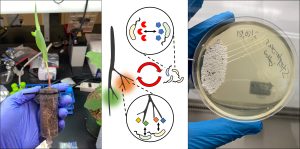Project No. 2437
PRIORITY PROJECT
Primary Supervisor
Dr William King – University of Southampton
Co-Supervisor(s)
Dr Binuraj Menon – University of Portsmouth
Dr Eleftheria Stavridou – NIAB East Malling
Summary
Soil is the most complex environment on earth, with just a gram of soil harbouring billions of bacteria.
Plants form intimate relationships with these soil microorganisms to maintain plant health and to aid them in periods of stress.
Plants attract microbial partners by releasing carbon (i.e. exudates) from their roots, allowing plants to communicate with their environment. Global change is altering the severity and frequency of environmental perturbations, including drought. Understanding how plant-microbial relationships are going to shift under drought stress will be critical to safeguard Agroecosystems and food security. One means of reducing plant stress is leveraging microorganisms that benefit the plant host, including greater nutrient acquisition and improved water retention.
We will investigate: (1) relationships between root exudates and microorganisms selected for drought tolerance, (2) using synthetic microbial communities and microbiome breeding to alter plant responses to drought, including shifting root architecture, and (3) how exudates and enzymes impact belowground interactions, including identifying enzymes with potential biotech applications. This project blends elements of microbiology, chemistry, and plant science. The potential candidate will use cutting-edge techniques, including single cell phenotyping, next generation sequencing, bioinformatics, and quantifying plant physiology and fieldwork. Project questions will be both basic and applied.
The broader goal of this project is to improve the sustainability of agroecosystems. The results of this project will advance our understanding of belowground feedback loops, primarily to devise methods to manipulate those loops to improve plant responses under stress.
Candidates should have an interest in environmental microbiology and be willing to work with plants in the lab and in the field. A background in biology, including microbiology, ecology, or chemistry, is advantageous but not necessary.

